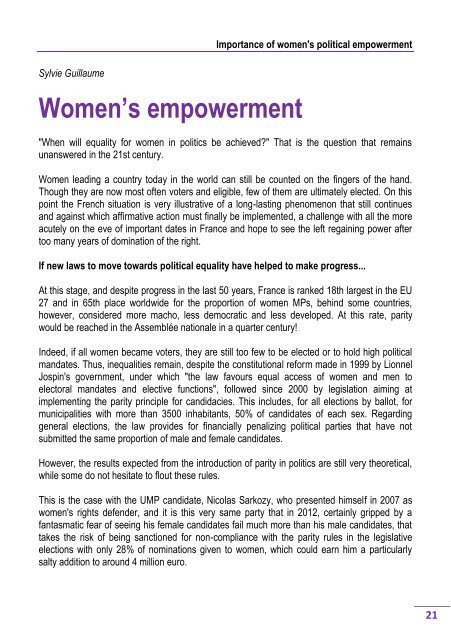Importance of women's political empowerement - Gurmai Zita
Importance of women's political empowerement - Gurmai Zita
Importance of women's political empowerement - Gurmai Zita
Create successful ePaper yourself
Turn your PDF publications into a flip-book with our unique Google optimized e-Paper software.
Sylvie Guillaume<br />
Women’s empowerment<br />
<strong>Importance</strong> <strong>of</strong> <strong>women's</strong> <strong>political</strong> empowerment<br />
"When will equality for women in politics be achieved?" That is the question that remains<br />
unanswered in the 21st century.<br />
Women leading a country today in the world can still be counted on the fingers <strong>of</strong> the hand.<br />
Though they are now most <strong>of</strong>ten voters and eligible, few <strong>of</strong> them are ultimately elected. On this<br />
point the French situation is very illustrative <strong>of</strong> a long-lasting phenomenon that still continues<br />
and against which affirmative action must finally be implemented, a challenge with all the more<br />
acutely on the eve <strong>of</strong> important dates in France and hope to see the left regaining power after<br />
too many years <strong>of</strong> domination <strong>of</strong> the right.<br />
If new laws to move towards <strong>political</strong> equality have helped to make progress...<br />
At this stage, and despite progress in the last 50 years, France is ranked 18th largest in the EU<br />
27 and in 65th place worldwide for the proportion <strong>of</strong> women MPs, behind some countries,<br />
however, considered more macho, less democratic and less developed. At this rate, parity<br />
would be reached in the Assemblée nationale in a quarter century!<br />
Indeed, if all women became voters, they are still too few to be elected or to hold high <strong>political</strong><br />
mandates. Thus, inequalities remain, despite the constitutional reform made in 1999 by Lionnel<br />
Jospin's government, under which "the law favours equal access <strong>of</strong> women and men to<br />
electoral mandates and elective functions", followed since 2000 by legislation aiming at<br />
implementing the parity principle for candidacies. This includes, for all elections by ballot, for<br />
municipalities with more than 3500 inhabitants, 50% <strong>of</strong> candidates <strong>of</strong> each sex. Regarding<br />
general elections, the law provides for financially penalizing <strong>political</strong> parties that have not<br />
submitted the same proportion <strong>of</strong> male and female candidates.<br />
However, the results expected from the introduction <strong>of</strong> parity in politics are still very theoretical,<br />
while some do not hesitate to flout these rules.<br />
This is the case with the UMP candidate, Nicolas Sarkozy, who presented himself in 2007 as<br />
<strong>women's</strong> rights defender, and it is this very same party that in 2012, certainly gripped by a<br />
fantasmatic fear <strong>of</strong> seeing his female candidates fail much more than his male candidates, that<br />
takes the risk <strong>of</strong> being sanctioned for non-compliance with the parity rules in the legislative<br />
elections with only 28% <strong>of</strong> nominations given to women, which could earn him a particularly<br />
salty addition to around 4 million euro.<br />
21



